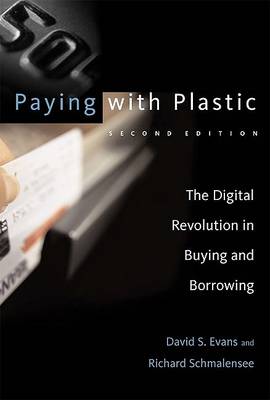The MIT Press
3 total works
The payment card business has evolved from its inception in the 1950s as a way to handle payment for expense-account lunches (Diners Club card) in today's complex sprawling industry that drives trillions of dollars in transaction volume each year.
Software platforms are the invisible engines that have created, touched, or transformed nearly every major industry for the past quarter century. They power everything from mobile phones and automobile navigation systems to search engines and web portals. They have been the source of enormous value to consumers and helped...Read more
Software platforms are the invisible engines that have created, touched, or transformed nearly every major industry for the past quarter century. They power everything from mobile phones and automobile navigation systems to search engines and web portals. They have been the source of enormous value to consumers and helped some entrepreneurs build great fortunes. And they are likely to drive change that will dwarf the business and technology revolution we have seen to this point. Invisible Engines examines the business dynamics and strategies used by firms that recognize the transformative power unleashed by this new revolution -- a revolution that will change both new and old industries.
The authors argue that in order to understand the successes of software platforms, we must first understand their role as a technological meeting ground where application developers and end users converge. Apple, Microsoft, and Google, for example, charge developers little or nothing for using their platforms and make most of their money from end users; Sony PlayStation and other game consoles, by contrast, subsidize users and make more money from developers, who pay royalties for access to the code they need to write games. More applications attract more users, and more users attract more applications. And more applications and more users lead to more profits.
Invisible Engines explores this story through the lens of the companies that have mastered this platform-balancing act. It offers detailed studies of the personal computer, video game console, personal digital assistant, smart mobile phone, and digital media software platform industries, focusing on the business decisions made by industry players to drive profits and stay a step ahead of the competition. Shorter discussions of Internet-based software platforms provide an important glimpse into a future in which the way we buy, pay, watch, listen, learn, and communicate will change forever. An electronic version of this book is available under a Creative Commons license.
The authors argue that in order to understand the successes of software platforms, we must first understand their role as a technological meeting ground where application developers and end users converge. Apple, Microsoft, and Google, for example, charge developers little or nothing for using their platforms and make most of their money from end users; Sony PlayStation and other game consoles, by contrast, subsidize users and make more money from developers, who pay royalties for access to the code they need to write games. More applications attract more users, and more users attract more applications. And more applications and more users lead to more profits.
Invisible Engines explores this story through the lens of the companies that have mastered this platform-balancing act. It offers detailed studies of the personal computer, video game console, personal digital assistant, smart mobile phone, and digital media software platform industries, focusing on the business decisions made by industry players to drive profits and stay a step ahead of the competition. Shorter discussions of Internet-based software platforms provide an important glimpse into a future in which the way we buy, pay, watch, listen, learn, and communicate will change forever. An electronic version of this book is available under a Creative Commons license.
This timely study evaluates four generic proposals for allowing free market forces to replace government regulation in the electric power industry and concludes that none of the deregulation alternatives considered represents a panacea for the performance failures associated with things as they are now. It proposes a balanced program...Read more
This timely study evaluates four generic proposals for allowing free market forces to replace government regulation in the electric power industry and concludes that none of the deregulation alternatives considered represents a panacea for the performance failures associated with things as they are now. It proposes a balanced program of regulatory reform and deregulation that promises to improve industry performance in the short run, resolve uncertainties about the costs and benefits of deregulation, and positions the industry for more extensive deregulation in the long run should interim experimentation with deregulation, structural, and regulatory reforms make it desirable. The book integrates modern microeconomic theory with a comprehensive analysis of the economic, technical, and institutional characteristics of modern electrical power systems. It emphasizes that casual analogies to successful deregulation efforts in other sectors of the economy are an inadequate and potentially misleading basis for public policy in the electric power industry, which has economic and technical characteristics that are quite different from those in other deregulated industries.


